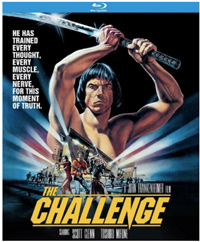 John Frankenheimer ended a three year hiatus following his 1979 environmental horror/creature feature Prophecy with a commendable martial-arts effort, The Challenge (1982). Starring Scott Glenn in his first lead performance, the curiosity was co-written by John Sayles and also stars Japanese legend Toshiro Mifune (who had previously appeared in Frankenheimer’s 1966 film, Grand Prix). Though it ultimately proves to be a nonsensical narrative in its clash of East meets West and traditional values threatened by the consumer cravings of the modernized world, some fantastic fight sequences (a pre-fame Steven Seagal served as technical advisor) and superb lensing from famed cinematographer Kozo Okazaki mark the title as worthy of recuperation for its conglomeration of vintage components.
John Frankenheimer ended a three year hiatus following his 1979 environmental horror/creature feature Prophecy with a commendable martial-arts effort, The Challenge (1982). Starring Scott Glenn in his first lead performance, the curiosity was co-written by John Sayles and also stars Japanese legend Toshiro Mifune (who had previously appeared in Frankenheimer’s 1966 film, Grand Prix). Though it ultimately proves to be a nonsensical narrative in its clash of East meets West and traditional values threatened by the consumer cravings of the modernized world, some fantastic fight sequences (a pre-fame Steven Seagal served as technical advisor) and superb lensing from famed cinematographer Kozo Okazaki mark the title as worthy of recuperation for its conglomeration of vintage components.
In 1982 Los Angeles, a down and out boxer, Rick Murphy (Glenn) is approached to transport a sacred sword to Kyoto in order to restore it to its rightful owner, a master samurai, Toru Yoshida (Mifune). Apparently, the swords were separated following a tragedy in 1945 which divided Toru from his brother Hideo (Atsuo Nakamura), who would become a rich industrialist desiring the swords for his own selfish purposes. Inadvertently, Rick becomes embroiled in the sibling rivalry and finds himself swayed between them at several points due to monetary promises. However, he eventually becomes impressed by the ways of the stoic Toru and thus requests to be trained by the master at his isolated compound.
Unfairly compared to the type of masculine exaggerations often featuring Chuck Norris (New York Times critic Janet Maslin reduced Glenn to a cross between him and Clint Eastwood), the film more accurately resembles Sydney Pollack’s 1974 classic, The Yakuza, which starred Robert Mitchum and also featured Okazaki as cinematographer. A final face-off in a sprawling office building is well worth the wait, while Jerry Goldsmith’s score tends to be a bit overbearing.
Though Frankenheimer’s film isn’t as innovative as Pollack’s, it’s oddly compelling, despite the silliness of Rick’s failed boxer learning the ways of the samurai to redeem his honor (the appeal is not unlike the odd attraction of The Keep, another early 80s title featuring Scott Glenn, the debut of Michael Mann and still curiously unavailable). Many of the film’s most outlandish elements have been recycled elsewhere, such as Glenn buried up to his neck in the sand for resilience training (Leslie Nielsen in Creepshow and David Bowie in Merry Christmas, Mister Lawrence underwent similar tortures). Likewise, a dining sequence finds Glenn forced to eat live creatures, including a squirming lobster, reminiscent of Park Chan-wook’s octopussy moment in Oldboy (2003).
Screenwriter John Sayles was fresh off of the success of Joe Dante’s The Howling (1981) and about to embark on his sophomore film, Lianna (1983), while co-writer Richard Maxwell makes his debut with The Challenge, eventually moving on to Wes Craven’s The Serpent and the Rainbow (1988). Much of their treatment seems to have included required elements, such as a slapdash romance between Glenn and the strikingly beautiful Donna Kei Benz (whose other notable title,1985’s Pray for Death, also just made it to Blu-ray courtesy of Arrow Video), which results in a blink or miss it sex sequence. Glenn, who has played a supporting character in a legion of notable films, is oddly compelling here, a bit gone to seed for such a role, already in his early 40s, a mixture of ungainliness and gracefulness. Some of this awkwardness is due to John. M Wheeler’s editing, which includes insanely weird close-ups of fish during an otherwise frenetic chase through the fish market.
The brotherly discord between Mifune and Atsuo Nakamura basically feels like a more violent version of some inheritance related Lillian Hellman play (its 1945 introduction in Kyoto is breezed over in seconds), but we’re forever at a distance from both characters. Initially, it’s not apparent Mifune’s Toru even speaks English, with recognizable character actor Clyde Kugatsu informing Glenn “if you mean it, he will understand” once Glenn decides he needs to learn the ways of the sword—but, in fact, Toru can, so moments like these become retroactively declawed (such as Glenn refusing to kneel before Mifune, which only results in the elder training him anyway).
Disc Review:
Kino Lorber releases the title under its Studio Classics label, presenting the transfer in 1.85:1. There are several moments where the widescreen aspect ratio demands some restoration, however. In moments of natural light, such as a day-time forest face-off between Mifune and Nakamura, grain is distractingly evident. No bonus features are included.
Final Thoughts:
Though it was one of the director’s least prolific decades, it seems Frankenheimer was keen to reinvent himself with a variety of genre heavy action vehicles, perhaps the least intricate of these being The Challenge (other items include the Nazi themed The Holcraft Covenant and the underrated Elmore Leonard adaptation, 52 Pick-Up, both receiving recent or upcoming Blu-ray releases courtesy of Kino Lorber). Those who cherished Frankenheimer’s last great film, 1998’s Ronin should definitely be pleased with this poorly remembered title.
Film Review: ★★★/☆☆☆☆☆
Disc Review: ★★★/☆☆☆☆☆


